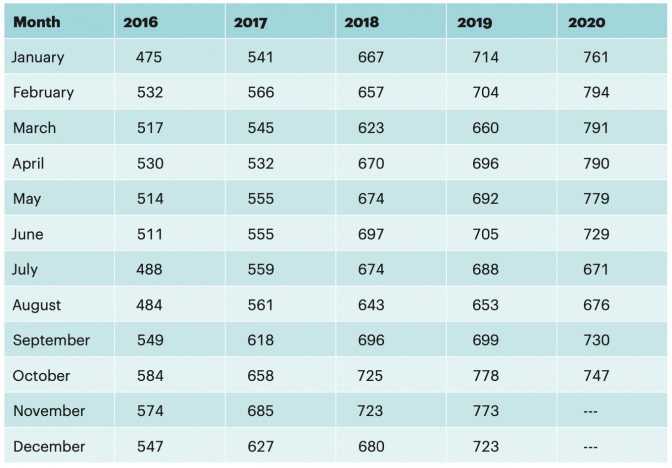Rationale:
Pre-trial detention should be used as an exceptional measure. To justify the detention of a person who is presumed innocent, there must be “a genuine requirement of public interest which, notwithstanding the presumption of innocence, outweighs the rule of respect for individual liberty”.[207] The CPT has noted that remand prisoners ‘are all too often held in dilapidated and overcrowded cells and frequently subjected to an impoverished regime.’[208] Remand detention can have severe psychological effects, with suicide rates higher among remand detainees than sentenced prisoners.[209] Research in Ireland has also shown that self-harm rates among the prisoner population are consistently higher for remand prisoners than those sentenced.[210]
Article 10.2(a) of the International Covenant on Civil and Political Rights (ICCPR) makes clear that remand prisoners should be held separately from sentenced prisoners, as remand prisoners have not been found guilty of an offence.
Current context:
There has been attention on the increased use of pre-trial detention around the world, described as ‘too often the norm, not the exception.’[211] In Ireland in 2019, of 8,939 committals to prison more than one-third, 3,366 were on remand.[212] The average number of people being held on remand is growing annually: 584 in 2017, 677 in 2018 and 707 in 2019.[213]
This sustained increase in the number of people held on remand means it is a challenge to detain the remand prison population separately from the sentenced prison population. In the meantime, the State maintains its reservation to ICCPR Article 10.2, stating:
“Ireland accepts the principles referred to in paragraph 2 of article 10 and implements them as far as practically possible. It reserves the right to regard full implementation of these principles as objectives to be achieved progressively.”[214]
Overcrowding continues to be cited as a barrier to its full implementation. The State’s only dedicated remand facility, Cloverhill prison has a maximum capacity of 431. Therefore, a reduction in the number of people being held on remand is needed to allow the State to comply with ICCPR Article 10.2. The new Limerick Prison will allow for both male and female remands and sentenced prisoners to be separated, though the Irish Prison Service has stated that this will be dependent upon operational or prisoner population constraints.[215]
The increasing seriousness of charges has been cited as a particular feature of remand prisoners by the Director General of the Irish Prison Service, who has said that remand prisoners are required to be held for much longer periods and at higher levels of security.[216] However, there is no published data available to interrogate this. Further publication of data and analysis is required to understand the reasons for the increasing use of pre-trial detention in Ireland, and introduce interventions to reverse these trends.
Remand detention should also be contextualised within broader economic and social issues. In 2019, 7.8% (697) of all people committed to prison declared they were of ‘no fixed abode’.[217] This is likely to be an under-estimate of the true number of homeless people ending up in prison. The Jesuit Centre for Faith and Justice highlighted that homelessness should never be used as a deciding factor on whether to impose a custodial remand sentence, and, that in such cases, conditions must be attached such as the Department of Housing, Planning and Local Government must be obliged to provide suitable accommodation so the person can be placed on bail.[218]
The first confirmed case of Covid-19 in Irish prisons was on 21 August 2020, of a young homeless woman remanded into custody charged with the offence of threatening and abusive behaviour.[219] This raises significant questions about the type of offences for which women are committed to prison, not to mention the risks associated with prison committals during a pandemic.
An IPS interim report on women on remand showed a 37% increase in the number of female remand committals over the period of 2013-2019.[220] The proportion of female committals on remand has increased steadily from 62% in 2013 to 71% of all female committals in 2017. The analysis shows that a number of women are being remanded into custody multiple times in one year, tripling from 43 women in 2013 to 125 women in 2019. The analysis also shows that from 2016-2019, over one-quarter (26.6%) of women on remand had a charge in the category of ‘theft and related offences’ as their most serious offence. This figure compares to 13% for men.
A reduction in the use of pre-trial detention can be brought about through the introduction of relevant supports to help people comply with bail conditions. The benefits of bail supports schemes include:
- allow the accused to remain within their community
- address offending-related behaviour where that is relevant
- encourage attendance at court
- increase court efficiency
- decrease the number of remands and
- result in cost savings
There are gender-specific bail programmes in other jurisdictions such as Glasgow Women’s Supported Bail Service in Scotland.[221] This programme helps to keep women out of prison through addressing issues that contribute to offending behaviour such as addiction, mental health, housing and homelessness.
In Ireland, the Bail Supervision Scheme (BSS) has successfully reduced the number of children remanded into custody. On average, the children enrolled on the BSS had a reduction in reoffending almost twice that of the control group.[222] While addressing child offending is different to that of the adult population, an age-appropriate adaptation of the scheme would support young adults (18-24) transitioning into adulthood and reduce the use of remand detention. IPRT has proposed that this should be further explored as part of the Draft Youth Justice Strategy, which commits to developing specific protocols for the management of young adults.[223]
During the Covid-19 pandemic, those on remand were most likely to have experienced harsher prison conditions. The rights of remand prisoners are further described in the next section.


